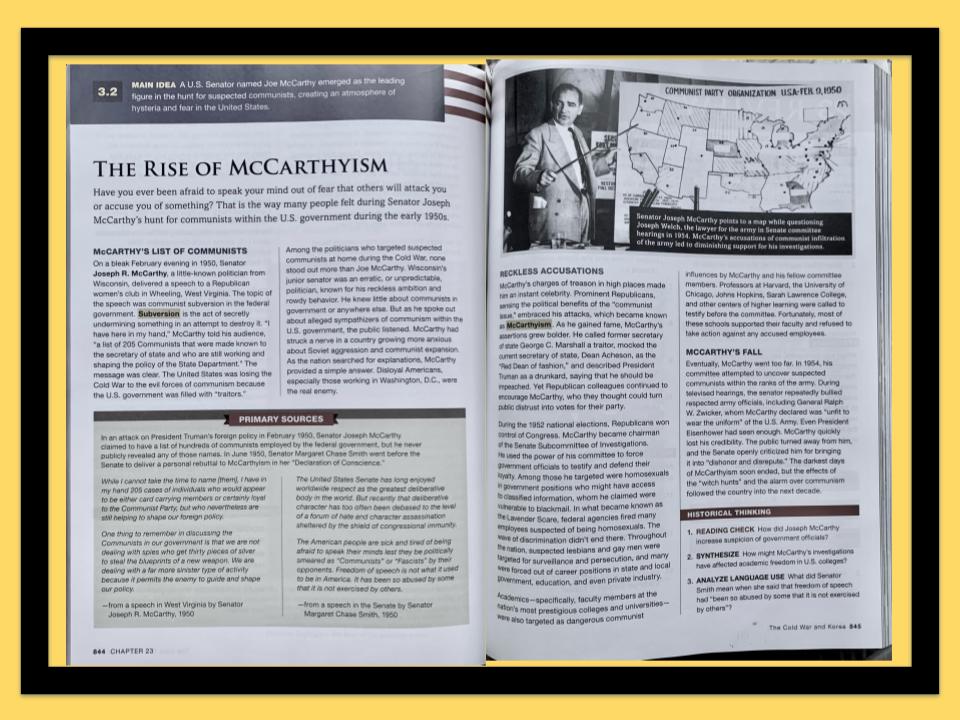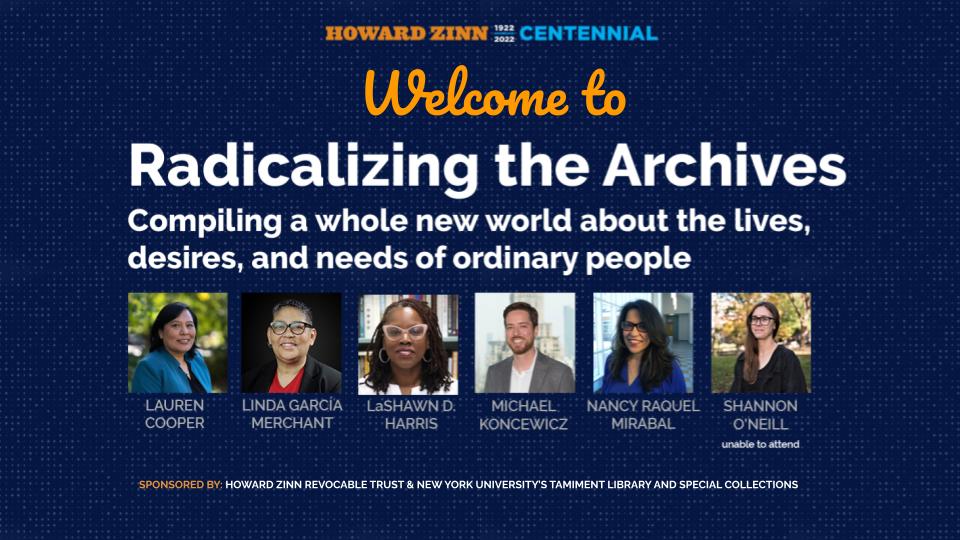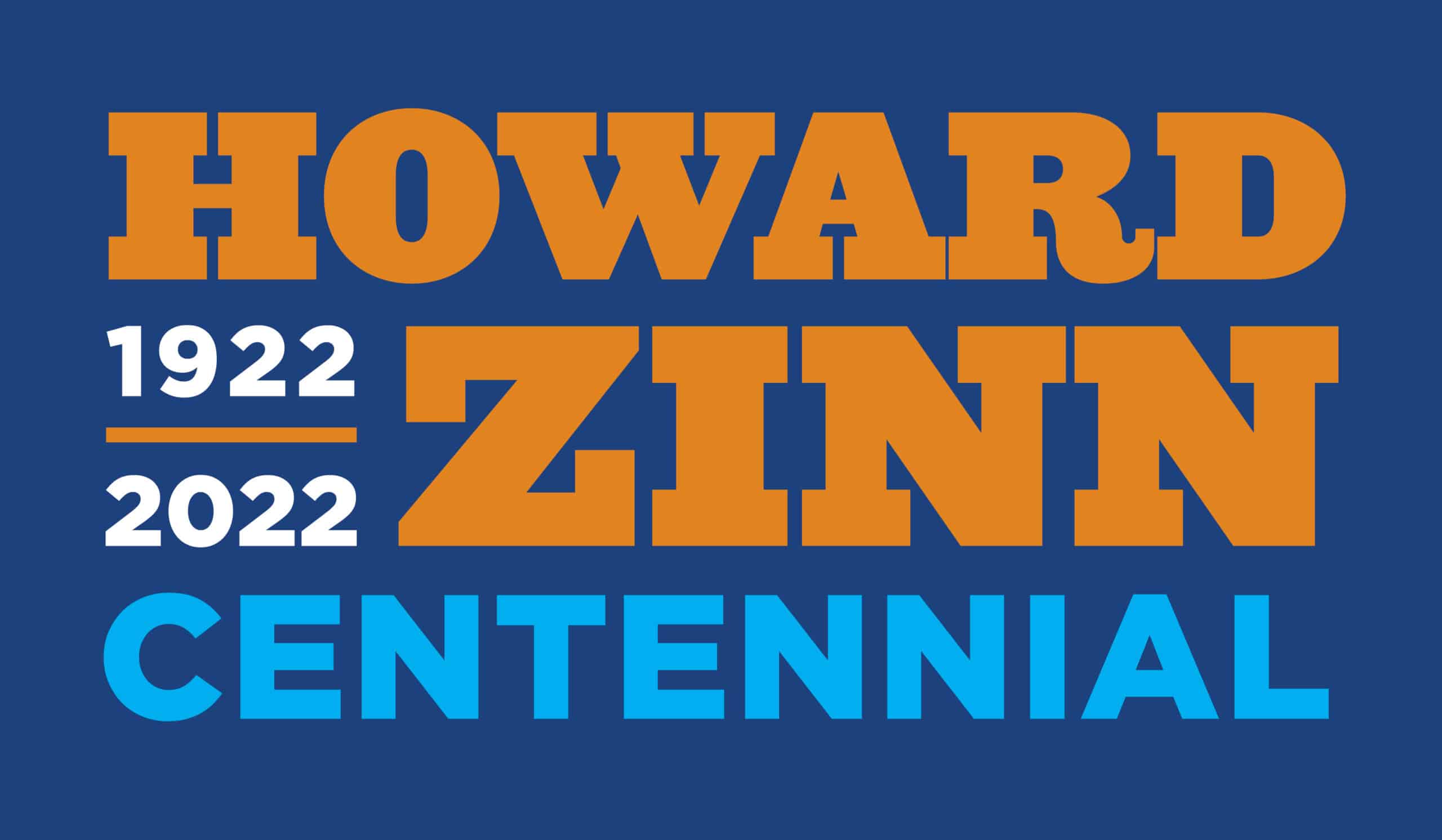Hundreds of people joined us online during the week of the 100th anniversary of Howard Zinn’s birth (Aug. 24, 1922), for three memorable events. We co-hosted a celebration with noted artists and historians who shared stories about Zinn’s life and legacy; a workshop on teaching about the Red Scare in light of today’s attacks on teaching people’s history; and a forum on “radicalizing the archives” to ensure that people’s history is archived and made accessible.
We share here a few highlights from each session. We encourage you to check out the links to recordings, transcripts, and related resources.
Celebration with Historians and Artists
On Howard Zinn’s actual 100th birthday, we held a celebration with noted speakers: Martín Espada, Kidada E. Williams, Myla Kabat-Zinn, Imani Perry, Alice Walker, Lauren Cooper, Bill Bigelow, and Anthony Arnove. Sports historian Dave Zirin and Teaching for Black Lives co-editor Jesse Hagopian were the MC’s.
The audiograms below give a flavor of the conversations.
|
|
|
The program was interspersed with clips of Howard Zinn speaking, including the example below of his skillful use of comedy to expose the absurdity of unjust practices and policies.
Once I push back my tears, I will continue to be inspired not just by Howard Zinn, but by the infinite web of hope we all continue to share. Thanks to all those whose work makes moments like tonight possible. I can breathe deeply again.
You filled my soul this evening.
OMG! The breadth of his work, the beauty of his words, the phenomenal capacity of his humanity. And a truly amazing roster of speakers and guests.
The theme of the event was based on Zinn’s autobiography, You Can’t Be Neutral on a Moving Train, and was co-sponsored by the Howard Zinn Trust, Tamiment Library at New York University, and Busboys and Poets.
Event Recording, Transcript, and Resources
Teaching About the Red Scare
The centennial week included a teacher workshop on the Red Scare, since the same tactics are used today to thwart the teaching of people’s history. Teachers from around the country were introduced to a mixer lesson about McCarthyism and to primary documents from the Tamiment Library.
The session began with a critical examination of a U.S. history textbook as an example of the misinformation students receive from the standard curriculum, the narrative that the anti-CRT bills are designed to enforce.
In the textbook:
- The Red Scare is reduced to the buffoon-like character of McCarthy, as if he were an anomaly, and as if there was not a larger, more pervasive political infrastructure of suppression.
- The words “African American” or “Black” do not appear anywhere. The words “labor,” “activist,” or “organizer” do not appear. We learn almost nothing about the people who were targeted.
- “The darkest days of McCarthyism soon ended.” This typical textbook treats the Red Scare as a discrete event or era rather than an ongoing politics that has been mobilized throughout U.S. history to neutralize progressive challenges to the status quo.
The mixer lesson, facilitated by Ursula Wolfe-Rocca and Cierra Kaler-Jones of the Zinn Education Project, challenged the textbook biases listed above. Primary documents, introduced by Michael Koncewicz of Tamiment, demonstrated how the 1940s Red Scare targeted teachers and the curriculum.
The workshop was hosted by the Zinn Education Project and co-sponsored by the Howard Zinn Revocable Trust and Tamiment-Wagner Collections, New York University.
Full Workshop Description and Resources
Radicalizing the Archives
The third event was a forum drawing on Zinn’s 1970 speech at the Society of American Archivists conference, when he urged archivists “to take the trouble to compile a whole new world of documentary material, about the lives, desires, needs, of ordinary people.”
The panelists highlighted efforts to humanize the archives and small groups of participants discussed today’s opportunities and challenges.
Each presenter shared examples of community-based, radical archives and/or described some of the challenges to archiving the history traditionally marginalized and discounted by large institutions. The presenters were:
- Lauren Cooper, HowardZinn.org digital curator with Teaching for Change; Center for Black Digital research librarian and managing director, Penn State University
- Michael Koncewicz, Michael Nash Archivist & Ewen Center Program, Tamiment-Wagner Collections, New York University
- LaShawn D. Harris, associate professor of history, Michigan State University
- Linda García Merchant, public humanities data librarian, University of Houston; co-founder of Chicana por mi Raza Digital Memory Collective
- Nancy Raquel Mirabal, associate professor of American Studies, University of Maryland
Panelists’ presentations were brief and offered a great overview to anyone new to or familiar with this topic. These participants’ comments highlight some of the points made in the forum:
I loved the concepts of thinking about what IS NOT in the archive, starting slowly, exploring adjacent or even unrelated archives, and utilizing materials other than primary source documents — like songs, objects, fiction, etc.
I learned that archives are not apolitical and that archives are intentionally curated. More specifically, archives and archivists have the power to either prove and preserve the existence of certain individuals, groups, communities, ideas, etc., or participate in the silencing and erasure of said individuals, groups, communities, ideas.
The forum was hosted by the Howard Zinn Revocable Trust, Teaching for Change, and Tamiment-Wagner Collections of New York University.









Twitter
Google plus
LinkedIn